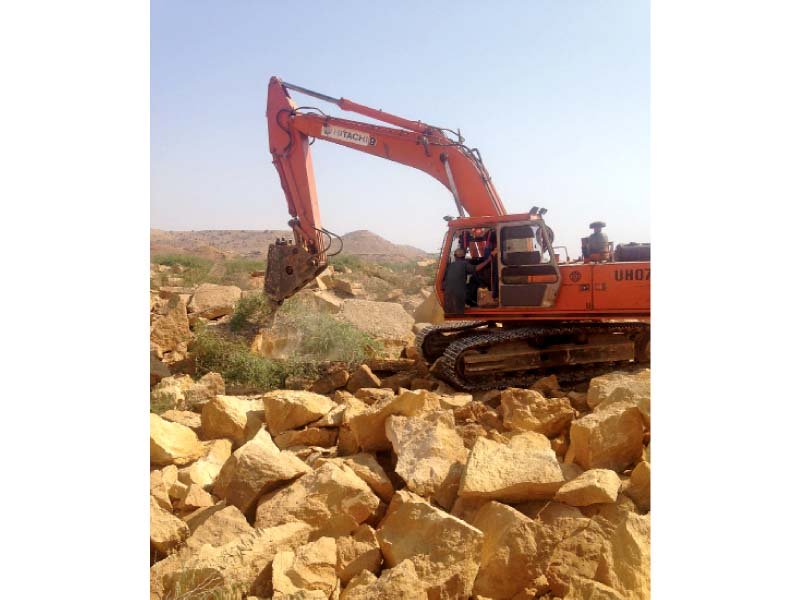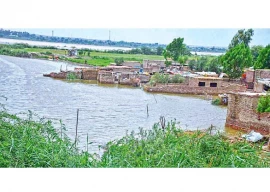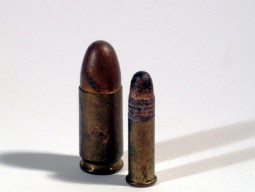
One of Sindh's oldest graveyards, Lakho Pir, is being dug up for sandstone and no one from the district administration has any clue who is behind it.
At least 10 dumpers of sandstone have been shifted from the archaeological site in the past two weeks. According to Lakho Pir graveyard's gatekeeper, Manthar, heavy machinery was brought in two weeks ago. "I asked them not to dig or take out the stones but they didn't listen to me," he told The Express Tribune. "I don't know who is behind this [quarrying]."
DHA plans 'modern’ graveyard exclusively for Phase VIII residents
Spread over 144 acres, Lakho Pir - the graveyard that dates back at least 800 years - is located 244 kilometres (km) away from Karachi and around 12km from Keenjhar Lake in Thatta. It is considered one of the oldest cemeteries of Sindh, followed by Raj Kapoor graveyard near Sujawal and an unnamed one located between Jungshahi and Thatta. It also houses the tomb of saint Makhdoom Lutfullah alias Lakho Pir.
The quarrying of sandstone was banned in 2007 after some archaeologists, including the then Sindh antiquities department secretary Dr Kaleemullah Lashari, intervened. "It is an illegal activity and cannot be allowed under any circumstances," said Lashari.
According to Dr Lashari, the law does not allow anyone to dig near a historical site. Unfortunately, he pointed out, there is no line of demarcation around this site. "If it [quarrying of sandstones] continues, it will destroy archaeological evidences," he feared.
The law prohibits mining within at least 200 feet of such sites, pointed out Dr Lashari. "It is an illegal practice," he said, adding that a similar excavation was carried out in 2007 but the government put an end to it immediately.
Manthar remembers the 2007 contractors and how they took away marbles from the graveyard. The quarrying of sandstones began in 1998, according to him, and continued around the graveyard area without any checks by the authorities. Some rare tombstones were also taken away by researchers, he claimed. "It is happening everywhere. I can't stop them alone."
The gatekeeper has little choice but to watch as large dumpers filled with sandstones trample over the centuries-old graves, demolishing quite a few along the way. "The new route [which passes through the graves] has been made recently by the contractor," said Manthar.
However, Manthar's superviser Taqi Muhammad aka Babo Shah, who is the caretaker of Lakho Pir graveyard, insisted that the contractor is merely cleaning up the site. "They are not digging but taking away the garbage [sandstones]," Mohammad told The Express Tribune.
A common man’s obituary: The saviour of Chawkandi tombs
According to him, a politician from Thatta approached him to allow the excavation of sandstones. "It is happening with my permission," he confirmed, not realising that quarrying has been banned by the government since 2007. Muhammad added that he allowed the sandstone to be taken away as it disturbs the followers when they arrive in the area for the annual Urs.
The contractor has been directed strictly not to dig out anything, he added. "Heavy stones are cut into pieces and are taken away to Karachi. It doesn't ruin the site," he said.
Meanwhile, Sindh mines and minerals department's assistant director for Thatta, Rabel Sarwar, denied issuing any lease to a contractor in the area. All machines will be taken into custody if someone is found quarrying stones in the limits of the archaeological site, he added.
Sindh's archaeology director Qasim Ali Qasim pointed out that Lakho Pir has not been declared a protected site as yet. He added, however, that the law still does not allow anyone to continue such activities within or around the historical location.
"It would be stopped immediately," he assured, adding that the district officials will be directed to submit a report. He promised to contact the district administration and the police to look into the illegal digging.
What is unfortunate is that the penalty for this crime is negligible. According to Sindh Archaeological Act, 1975, the maximum punishment is six months in jail or Rs5,000 as fine, said Qasim.
Published in The Express Tribune, February 26th, 2016.

















COMMENTS (2)
Comments are moderated and generally will be posted if they are on-topic and not abusive.
For more information, please see our Comments FAQ